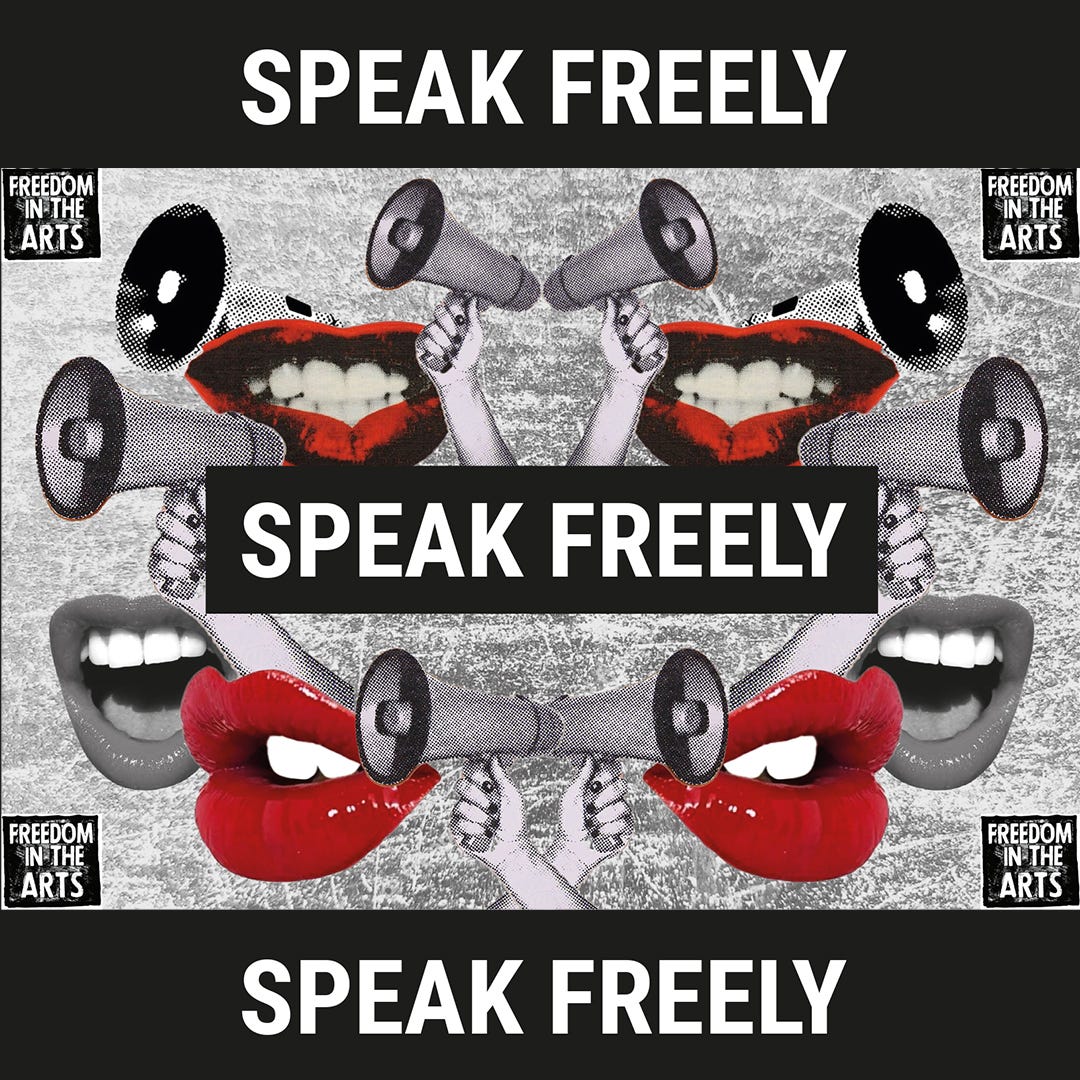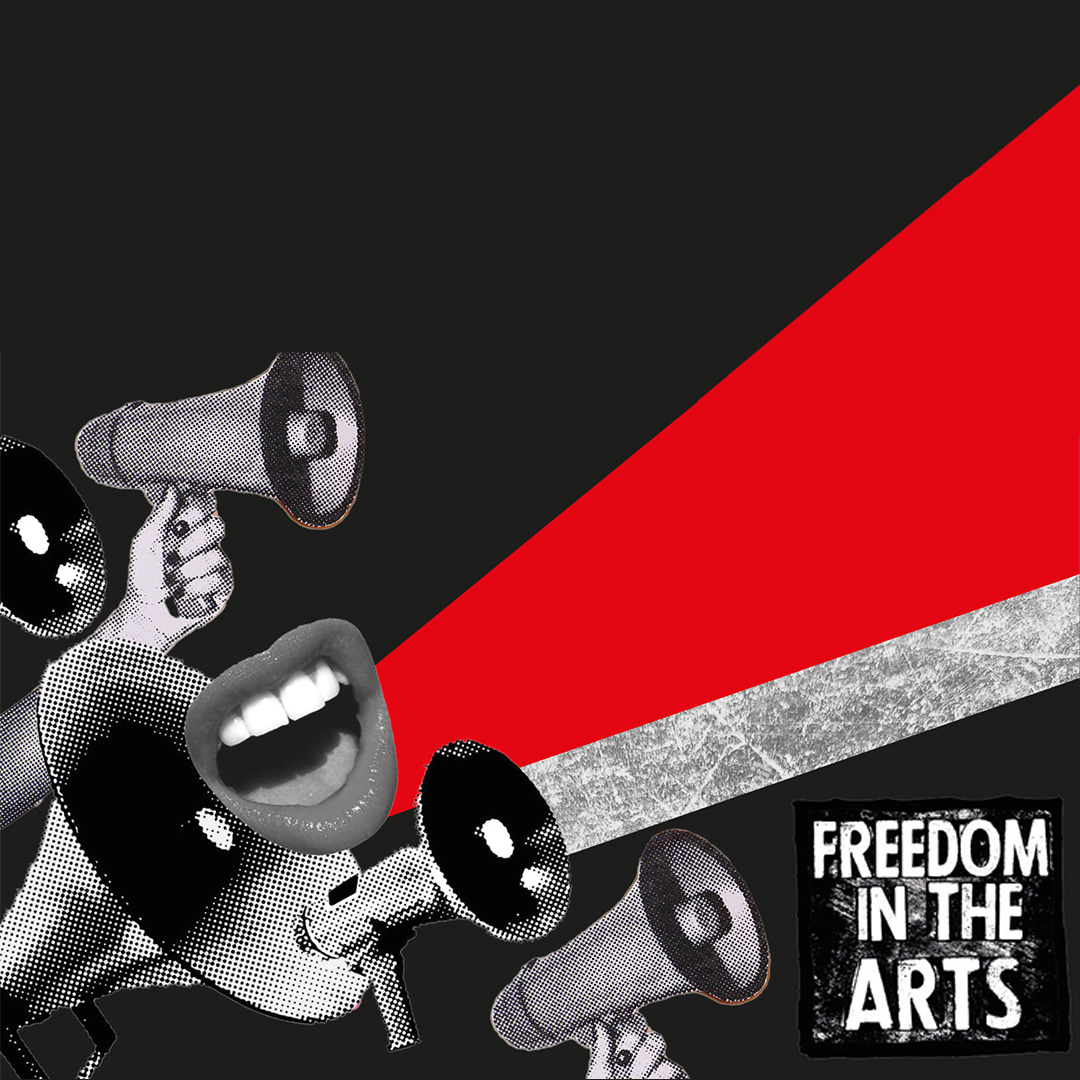Afraid to Speak Freely
Freedom in the Arts published its first major report this week on artistic censorship.
The Importance of Free Expression in the Arts: A Call to Action
As artists, we are constantly expected to challenge norms, push boundaries, and provoke thought. These expectations are the foundation of what makes the arts so vital in any society. But today, many of us in the arts are feeling increasingly constrained. The freedom to speak out—whether in our creative work, personal views, or public discourse—appears to be under threat like never before.
I have spent much of my career as a choreographer navigating the complex and ever-changing landscape of the arts. Through this journey, one thing has become abundantly clear: we are at a critical juncture. Over the last few years, artists have increasingly found themselves operating within a sector that appears to value ideological conformity over the diversity of thought and expression. This growing pressure to conform to a specific set of beliefs has caused many of us to question the very freedoms that once made the arts such a powerful force for change and innovation.
This is why my colleague, Denise Fahmy, and I founded Freedom in the Arts (FITA) in 2023. Our mission is simple yet crucial: to champion free expression in the arts. We’ve seen firsthand how the pressure to align with specific ideological stances—often framed as ‘progressive’ or ‘woke’—has begun to limit the space in which artists can truly be themselves. This isn’t just about political views; it’s about the ability to speak openly, to disagree, and to challenge the prevailing narratives without fear of professional repercussions or personal attack. The reality is that when an artist is forced into silence or compliance, we all lose.
Through FITA, we aim to provide a platform and support network for artists who want to create without fear of retaliation. We believe that freedom of expression isn’t just an ideal, but a foundational principle that should be safeguarded in every creative practice. By fostering an environment in which artists can speak their minds and create freely, we hope to reinstate the vitality and originality that has always been the hallmark of artistic innovation.
Recently, we released our report, Afraid to Speak Freely, which outlines some of the alarming trends we’re seeing within the arts sector. This report is vital because it not only highlights the extent of self-censorship in the field but also provides concrete data and case studies that demonstrate the profound effects of this phenomenon. Many artists now feel the need to self-censor in order to avoid professional consequences such as job loss, exclusion from projects, or public vilification. These are not abstract concerns—many of the individuals featured in the report have experienced this firsthand.
The statistics presented in the report are telling. A majority of artists surveyed reported that they rarely or never felt free to speak openly about their opinions. This is a far cry from the ideal of the arts as a space where all viewpoints can be heard. Instead, what we see is a growing environment of fear, in which the consequences for deviating from the accepted line can be career-ending. This climate of self-censorship is dangerous because it stifles the very creativity that the arts are meant to foster. How can we expect the arts to challenge society, reflect diverse perspectives, or offer new insights if artists are afraid to express themselves freely?
What’s even more concerning is that this pressure to conform isn’t just coming from outside forces. It’s often institutionalised within arts organisations themselves. Many institutions, whether consciously or unconsciously, impose a form of ideological gatekeeping. They align themselves with specific political or social stances and create an environment where dissenting voices are not just unwelcome—they are actively silenced. For many artists, this means that their creative freedom is compromised not just by the public or their audiences, but by the very institutions they work with.
The consequences of this narrowing of expression are profound. We risk losing the diversity of thought that fuels artistic innovation. Art has always thrived on its ability to push the boundaries of what is considered acceptable or normal, but when artists are afraid to take risks or speak out, we lose the potential for transformative work that can challenge societal norms and provoke meaningful conversations.
At FITA, we hope that our report will serve as a catalyst for conversation and change. We want to open up a discussion about how we, as a sector, can protect the freedoms that allow us to create fearlessly. We need to find ways to ensure that the arts remain a space where all voices can be heard, where difference is celebrated, and where artists can express themselves authentically. This isn’t just about defending one individual’s right to speak their mind—it’s about defending the very soul of the arts itself.
Thank you for taking the time to engage with these findings. I encourage you to reflect on the issues raised in this report and think about what we can all do to create an environment where free expression is not just protected but actively celebrated. The freedom to speak and create without fear is not a luxury—it is essential to the health and future of the arts.
Download the Report HERE







We desperately need something like FITA in the states. Most American arts institutions have been thoroughly ideologically captured in recent times. I'm tempted to go so far as to say that they're doing more to stifle art than to support it at this point.
https://cinematimshel.substack.com/p/ideologically-out-of-line-and-insufficiently